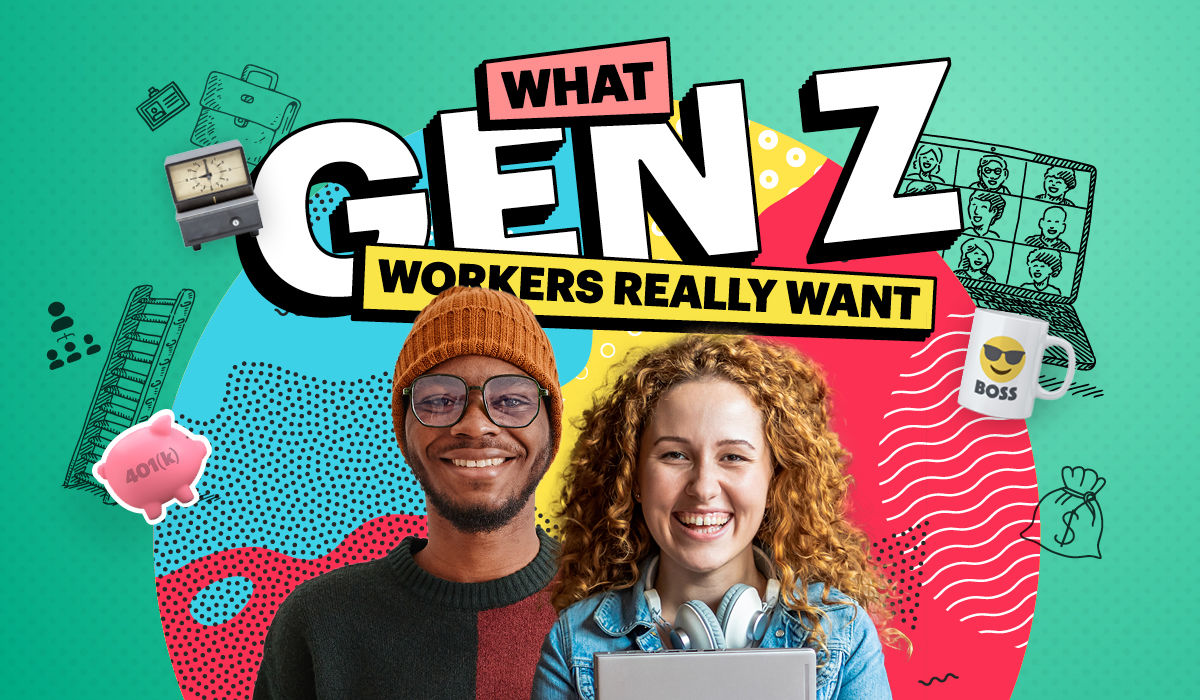Everything You Assumed About Gen Z at Work is Wrong
Does Gen Z think long term about their careers? This and other surprising takeaways from our recent survey about Gen Z at work.

What do you think of when you picture a Gen Zer’s attitudes about work? Is it someone who wants to climb the corporate ladder? Become a manager? Expects to meet financial goals and retire?
No? We didn’t either.
But according to our new report, What Gen Z Workers Really Want, Gen Z is proving stereotypes wrong. Unlike millennials, who have a reputation for job hopping, (21% changed jobs in the last year), Gen Z plans to stay with their company long enough to become management.
Here are some other Gen Z myths debunked so that your organization can tap the potential of this upcoming generation.

Gen Z stereotypes
Generation Z—those born between 1997 and 2012—have the reputation of being multitaskers with a short attention span who live their lives online. Many think of Gen Z as having gender politics and environmental consciousness deep in their DNA. When they’re not canceling transphobic authors beloved to millennials, they’re candidly holding forth on TikTok about their mental health struggles.
While both groups qualify as digital natives born after the internet, millennials and Gen Z both have a reputation of being more politically progressive than older generations. These stereotypes may lead people to think that for the youngest generation, “work” is not as important as “woke,” or that Gen Z doesn’t want to work for someone else and define themselves by their non-work life.

We asked six Gen Z employees to react to our survey results. Were they surprised? Watch to find out!
Millennials and Gen Z differences
The difference between millennial trends and Gen Z trends in the workplace are stark. Many millennials started their careers just after the 2008 recession and quickly grew disenchanted by their parents’ path of focusing on career. Boomers criticized millennial coworkers as being impatient, notoriously blaming millennials’ inability to afford houses due to avocado toast habits. Millennials lashed back that job shortages and soaring home prices made #adulting difficult without the supplemental income of a side hustle.
Forced to take on gigs just to make ends meet, some millennials turned away from the career-and-work focus of boomers and focused more on company culture when considering a new job. Disillusioned about the stability of any position in an unstable job market, millennials valued career growth over longevity. Frustrated at a lack of buying power in a boomer-dominated economy, millennials delayed marriage and childbirth.

Millennials and Gen Z both value diversity and inclusion in the workplace. But shrewd managers need to understand where these two generations diverge. Gen Z employees place a lot of trust in their companies, believing them to be sources of growth and the means to achieve financial and professional goals. A significant 75% of respondents indicated that they regard their career as a means to achieve self-fulfillment. Companies can prove them right by prioritizing Gen Z employee retention and making growth attainable.

Gen Z values benefits
Despite cultural assumptions that Gen Z employees don’t plan to stick around organizations for long, most (66%) want to pursue management at their current companies. Gen Z respondents in the survey prioritized (61%) benefits over both compensation (50%) and professional growth (30%). (Note that respondents were asked to select all that apply.) A total rewards compensation package designed to entice someone born in 1998 might need to look different from a candidate ten years older.

Learn about your youngest employees
People leaders who are used to the values of the millennial generation, who make up the majority of the workforce, need to adapt their management strategies when Gen Z joins their organization. Understanding an organization’s people is crucial for any leader. Learn more about Gen Z trends and become a better manager by reading the full report to better understand the desires and expectations of this generation.

Get Outsmart content straight to your inbox
Subscribe to the People Insights Monthly newsletter for actionable insights and stories.
Subscribe now